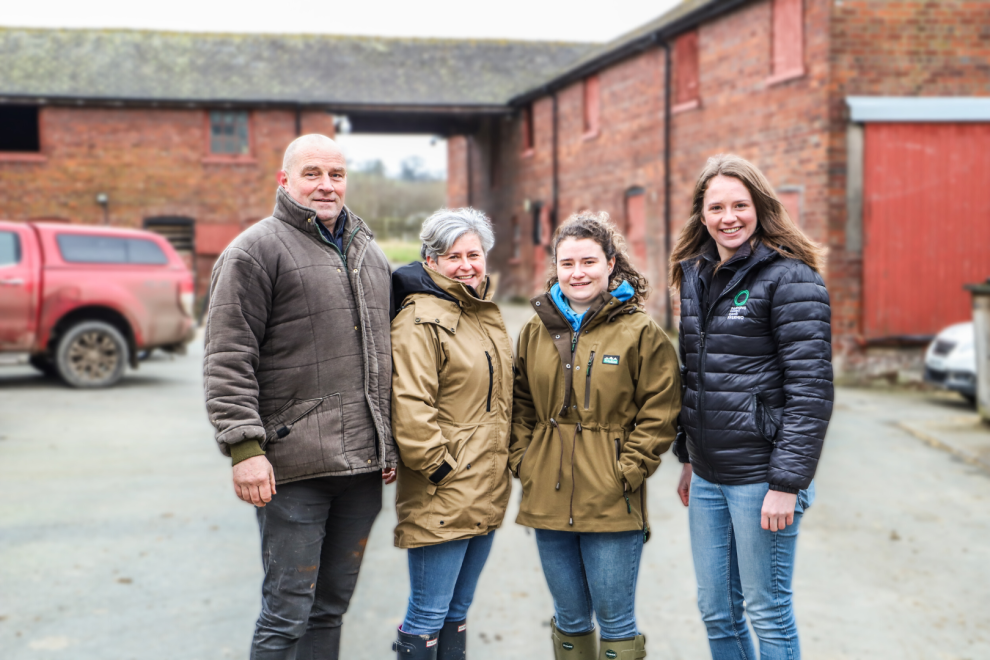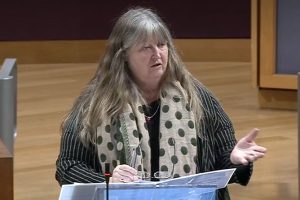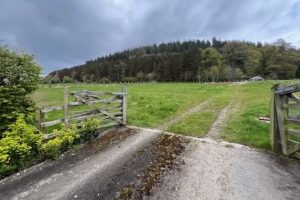Taking a proactive approach to tackling Johne’s, by regularly testing and removing infected animals, has reduced disease incidence from 16% to zero in the beef herd at a Welsh family farm which has taken advantage of multiple Farming Connect funded services.
Blood testing for Johne’s is one of many services offered under the new Farming Connect programme that Gary and Anwen Orrells and their daughter and son, Elin, aged 22, and 19-year-old Jonny, have tapped into.
They have tested for wormer resistance in their sheep flock, monitored the nutrient status of farm soils, gained valuable skills and training and accessed other services too.
“These have really helped us to advance the business,’’ says Gary.
The family farms a mixture of owned and rented land across 1,170 acres at Abermule, Montgomeryshire, and Shropshire, where they have arable, beef and sheep enterprises; diversified income is generated from renewable energy and DIY livery.
The 140-head spring calving suckler herd of British Blue-cross and Aberdeen Angus-cross cows produces calves that are sold as 10–12-month-old stores.
Although sexed semen is now used to produce herd replacements, the business previously sourced bulling heifers from dairy farms.
This system had a significant weakness; after their first calving, some animals lost body condition and Johne’s was suspected as the cause.
In 2019, the Orrells family embarked on a blood testing programme with funding from Farming Connect.
In 2019, those samples revealed that of the 32 heifers tested, five were positive for Johne’s – a 16% incidence rate. Those animals were sold as non-breeding stock.
After a subsequent annual programme of testing and removal, in 2023 there were no cases of Johne’s identified int the 31 mostly homebred heifers.
Gary says the support from Farming Connect has been invaluable. “We have a great connection with our vets, they put us in touch with our local Farming Connect development officer, Elin Williams, and she signposted us to the blood testing service and other services too.’’
He is relieved that the high health status of cattle has been restored. “We also have a small herd of pedigree Limousins so the health status on our farm as a package has to be perfect.’’
That position applies to the closed flock of 1,200 breeding ewes too.
The flock consists of 500 Improved Welsh and 700 Aberfield ewes with all rams purchased through Innovis and the ProHill Scheme. There is also a small flock of pedigree North Country Cheviot ewes.
Gary admits he had “no inkling’’ that there could be an issue with drench resistance but when weaned lambs started to under-perform it was a red flag.
To establish if there was an issue, he embarked on a Farming Connect focus farm project, with faecal egg counts taken from fat lambs; these were sampled before drenching and also 14 days after treatment, to establish the efficacy of white, yellow and clear wormers.
This exercise showed that the white wormer reduced worm burdens by only 54% but that it could be used effectively for nematodirus control. The other drenches were found to be effective.
The Orrells family now only use white drench in the spring to protect lambs against nematodirus.
“Nematodirus is the parasite we have concerns about until the lambs are six to eight weeks old so it is reassuring to know that if we don’t overuse white drench, they are still effective,’’ says Gary.
Mixed grazing with sheep and cattle is also used as a tool for controlling pasture worm burdens.
How that pasture and the Orrells’ arable crops perform is dictated in part by the nutrient status of the farm soils.
With poultry manure applied strategically to arable land at three tonne an acre to deliver phosphate and potassium (P and K), soil sampling is used to ensure soil are at the correct index for these and other nutrients.
“This sampling has shown us that we are now getting to a point where the indexes on some fields are where they need to be for P and K so we can tailor our manure spreading programme accordingly,’’ says Gary.
In the new Farming Connect programme, group sampling is up to 90% funded while for individual sampling Farming Connect meets up to 70% of the cost.
Farming Connect discussion groups have also been instrumental in helping the Orrells family shape their system.
The small group scenario of these discussion groups is helpful in provoking discussion, says Gary, who has been a member of groups that focus on beef and nutrition, and also a sheep producer discussion group which looked specifically at cost of production and benchmarking and included a number of technical meetings.
Gary is also a member of the Farming Connect Farmer Steering Group.
Farming Connect has helped to nurture the Orells’ next generation too, by providing opportunities to gain valuable skills and training.
With up to 80% funding from the Farming Connect Lifelong learning and Development programme, Elin has completed a first aid course and gained a certificate in the safe use of medicines while Jonny has embarked on training in the safe use of pesticides which was funded by 40%.
“If farmers had to fully pay for these courses, it would be a large investment and would perhaps be a barrier to getting the training done so having 80% of the cost met by Farming Connect is a big incentive to complete the courses and to make sure that things are done correctly and safely on the farm,’’ says Elin.
Another Farming Connect subsidised course that Jonny completed – a two-day advanced sheep shearing course – was instrumental in helping him to secure work in New Zealand this winter.
Elin, who is a fourth-year agricultural student at Aberystwyth University, has also broadened her horizons since securing a place on the Farming Connect Agri Academy in 2020.
Although the pandemic curtailed the opportunities that the Agri Academy gives for travelling and meeting people, Elin says she gained confidence, knowledge and a valuable network of contacts as well as forging friendships.
“It was an incredible experience and as well as the knowledge and skills it provided me with, I have got to know similar minded people from across Wales.’’
Elin urged other farmers to make full use of the services offered by the Farming Connect programme.
“We are very fortunate in Wales to have the opportunities presented by Farming Connect, it makes good business sense to use them.’’
The business’s local Farming Connect development officer, Elin Williams, says that through regular contact with the Orrells and their participation in events and meetings, she had gained an understanding their business and their requirements.
“This has allowed me to signpost the family to the relevant Farming Connect services and this has contributed to these multiple business improvements.’’
The family, she adds, has consistently taken a progressive approach by continuously reviewing business performance and identifying areas for improvement.
“The work done here showcases that regularly evaluating and monitoring performance along with seeking advice and testing, when necessary, can lead to significant gains,’’ she says.
“As the Orrells family has done, I would encourage any business to get in touch with their local Farming Connect Development Officer to discuss their needs as some services could prove to be valuable and lead to improvements, as the Orrells family have demonstrated.’’
For further information on how to contact your Local Development Officer visit https://businesswales.gov.wales/farmingconnect/contact-us/your-local-development-officer



















